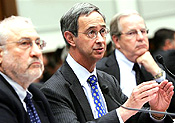-
(单词翻译:双击或拖选)
Majority Democrats2 have repeatedly underscored their intention to legislate3 major changes to impose greater regulation on financial markets when a new Congress convenes4 next year.
The hearing of the House Financial Services Committee covered numerous complex aspects of the sub-prime mortgage-based financial crisis, and the role played by complicated financial instruments.
Experts and lawmakers debated root causes, but agreed that further action is required. To accomplish that, Democrats and Republicans will have to agree on a way forward.
As of now, there is strong bipartisan agreement on the need to throughly examine how the crisis came about, to perform an autopsy5 as one lawmaker called it, as well as steps to ensure it does not recur6.
Here are Pennsylvania Democrat1 Paul Kanjorski, and New Jersey7 Republican Scott Garrett:
KANJORSKI: "We have reached a crossroads. Because our current regulatory regime has failed we now must design a robust8, effective, supervisory system for the future."
GARRETT: "It's important that we work in a bipartisan fashion to move forward to ensure that we put in place the property regulatory framework to allow our economy to grow again."
But there are differences in approach as many Republicans voice opposition9 to any future over-regulation of markets.
Alabama Republican Spencer Bachus, and Georgia's Tom Price:
BACHUS: "We need, I think number one, to realize there are limits on what government can do to intervene in this market process."
PRICE: "What is taking place is truly unprecedented10. Direct federal intervention11 in individual mortgages, broad over-reach by the Federal Reserve, unlimited12 use of taxpayer13 dollars and steps to nationalize banks. These steps are in their totality, I fear, an assault on American principles and on capitalism14 itself."
Experts stressed that where financial market reform is concerned the question is not one of too much or too little, but the most effective way to carry it out.
 |
| From left: Joseph Stiglitz, Joel Seligman, Manuel Johnson testifying before the House Financial Services Committee, 21 Oct 2008 |
Joseph Stiglitz, the 2001 Nobel economics prize laureate, is a strong proponent15 of an active government role:
"The de-regulatory philosophy that has prevailed during the past quarter century has no grounding in economic theory nor historical experience," said Joseph Stiglitz. "Quite the contrary, modern economic theory explains why the government must take an active role especially in regulating financial markets."
Key priorities, Stiglitz argues, should be broader reform of financial corporate16 governance, and protection for American homeowners as the U.S. economy slides deeper into recession.
Manuel Johnson, a noted17 financial accounting18 expert, argues for a cautious approach that would not, as he puts it, role back the gains made in the U.S. financial system:
"From my perspective, permanent government control over the credit allocation process is economically inefficient19 and potentially, even more unstable," said Manuel Johnson.
Joel Seligman of Columbia University says members of Congress must distinguish between emergency legislation, such as the more than $700-billion rescue package approved recently, and longer-term efforts. He urges lawmakers to organize and streamline20 their investigations:
"I would strongly urge each house of Congress to create a select committee similar to that employed after September 11th [2001], to provide a focused and less contentious21 review of what should be done," said Joel Seligman.
Economist22 Alice Rivlin urges lawmakers to, as she puts it, check their philosophical23 slogans at the door as they go to work on what she calls a difficult and painstaking24 job:
"Too many attempts to re-think regulation of financial markets in recent years have been de-railed by ideologues shouting that regulation is always bad or alternatively that we just need more of it," sid Alice Rivlin.
Tuesday's House hearing was one of several that congressional committees are holding on the financial crisis ahead of the U.S presidential election on November 4
 收听单词发音
收听单词发音
1
democrat

|
|
| n.民主主义者,民主人士;民主党党员 | |
参考例句: |
|
|
|
2
democrats

|
|
| n.民主主义者,民主人士( democrat的名词复数 ) | |
参考例句: |
|
|
|
3
legislate

|
|
| vt.制定法律;n.法规,律例;立法 | |
参考例句: |
|
|
|
4
convenes

|
|
| 召开( convene的第三人称单数 ); 召集; (为正式会议而)聚集; 集合 | |
参考例句: |
|
|
|
5
autopsy

|
|
| n.尸体解剖;尸检 | |
参考例句: |
|
|
|
6
recur

|
|
| vi.复发,重现,再发生 | |
参考例句: |
|
|
|
7
jersey

|
|
| n.运动衫 | |
参考例句: |
|
|
|
8
robust

|
|
| adj.强壮的,强健的,粗野的,需要体力的,浓的 | |
参考例句: |
|
|
|
9
opposition

|
|
| n.反对,敌对 | |
参考例句: |
|
|
|
10
unprecedented

|
|
| adj.无前例的,新奇的 | |
参考例句: |
|
|
|
11
intervention

|
|
| n.介入,干涉,干预 | |
参考例句: |
|
|
|
12
unlimited

|
|
| adj.无限的,不受控制的,无条件的 | |
参考例句: |
|
|
|
13
taxpayer

|
|
| n.纳税人 | |
参考例句: |
|
|
|
14
capitalism

|
|
| n.资本主义 | |
参考例句: |
|
|
|
15
proponent

|
|
| n.建议者;支持者;adj.建议的 | |
参考例句: |
|
|
|
16
corporate

|
|
| adj.共同的,全体的;公司的,企业的 | |
参考例句: |
|
|
|
17
noted

|
|
| adj.著名的,知名的 | |
参考例句: |
|
|
|
18
accounting

|
|
| n.会计,会计学,借贷对照表 | |
参考例句: |
|
|
|
19
inefficient

|
|
| adj.效率低的,无效的 | |
参考例句: |
|
|
|
20
streamline

|
|
| vt.使成流线型;使简化;使现代化 | |
参考例句: |
|
|
|
21
contentious

|
|
| adj.好辩的,善争吵的 | |
参考例句: |
|
|
|
22
economist

|
|
| n.经济学家,经济专家,节俭的人 | |
参考例句: |
|
|
|
23
philosophical

|
|
| adj.哲学家的,哲学上的,达观的 | |
参考例句: |
|
|
|
24
painstaking

|
|
| adj.苦干的;艰苦的,费力的,刻苦的 | |
参考例句: |
|
|
|















